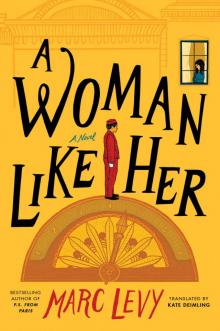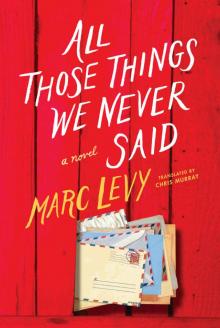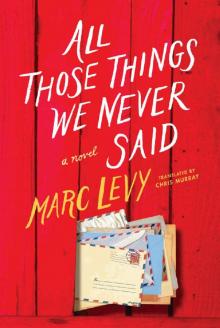A Woman Like Her Read online
Page 6
“You’re really something.” Lali chuckled. “If you’re not going to eat your cake, can I have it? And anyway, what about you? What are you like? Sorry, I’m not as discreet as my husband, quite the opposite, actually.”
“I used to be an actress. I studied at Stella Adler. I got some small roles and finally landed a part in a TV series.”
“And now?”
“I do audiobooks.”
“Do you work for free?”
“No, but it doesn’t pay very well.”
“So if you’re a professional, and you’re getting paid, why did you use the past tense? You’re still an actress, as far as I’m concerned.”
“Yes, but not the kind who signs autographs.”
“I was a seamstress. Do you think I signed any autographs?”
Lali dabbed her lips with her napkin. The two women looked at each other.
“My husband will get home late tonight completely exhausted, but he’ll leave for work at dawn as usual—maybe even earlier than usual. If I let him, he’d set up a cot in the basement of your building so your evening plans wouldn’t be disturbed while Mr. Rivera’s in the hospital. My husband takes his sense of duty to the extreme. I, on the other hand, am worried about what will become of us.”
“The building will find someone to fill in for Mr. Rivera soon. I’m sure Mr. Groomlat is already working on it. Don’t worry, everything will go back to normal, I’ll make sure of it.”
“Can you make sure that Mr. Groomlat doesn’t convince your neighbors to go a different route? Times are changing, I know, but if things in your building change … if Deepak can’t achieve his goal, he’ll never get over it.”
“What goal?”
“You’ll think it’s silly—I’ll tell you about it another time. I have to hurry home. Don’t tell him we saw each other. Deepak lives in a lobby and an elevator. He likes to keep his worlds … compartmentalized.”
Lali let Chloe pick up the tab and left without worrying whether Chloe would find the right kind of taxicab to take her home.
6
“What do you mean they had to check me out ‘at the source’?” Sanji asked.
“In India.”
“They called my bank in Mumbai?”
“That’s not all they did.”
Since Sanji didn’t seem to understand the situation, Sam made a confession.
“I had no choice. You come from far away with an ambitious project, how was I supposed to do this without any references? If you were American or even European maybe, but …”
“But I’m from the third world, a country full of bandits and slums, is that it? India is a modernized country that beats yours in everything except arrogance,” Sanji fumed.
“With most of its wealth in the hands of a small number of elites.”
“It’s the same here! Success is impossible without the right connections! Whatever happened to the American Dream?”
“I didn’t say it was impossible. But I mean … Come on, Sanji, raising that much money in just a few weeks—be realistic!”
“I only had one condition—keeping my family out of this. I’m counting on you to make sure this doesn’t happen again, no exceptions.”
“I wish it were that simple,” Sam grumbled. “Your uncles trashed you. They called you a bum, a petty thief, the black sheep of the family, a pathological liar, and that’s not the half of it.”
“They called me all those things? So they still want war.”
“It’s high time for you to fight back. If they spread this vitriol in financial circles, all our appointments are going to end up canceled. Now, I just have to ask you one question. You can tell me to get lost if you want, or just fire me, but I have to ask.”
“You want to know if they’re telling the truth.”
Sam picked up the briefcase on the table.
“Fine, I quit. You know what, maybe it’s better this way. Do you think you’re the only one whose future is at stake here? What do you think will happen if my boss finds out that I brought one of our biggest clients to meet a guy I believe in just because we had a good time in England and he’s got a good head on his shoulders?”
“An Indian head,” Sanji said with a bitter laugh.
“You’ve got to admit your behavior isn’t making this easy. ‘Where does your friend stay when he’s in New York, Sam?’ In Harlem, with an aunt and uncle he doesn’t even know. ‘Did his chauffeur drop him off?’ No, he takes the subway. ‘Why was he late for an appointment with our biggest client—?’”
“I guess I should have come in on an elephant. That would’ve fit the stereotype.”
Sanji went over to the window.
“My uncles won’t accept that I own a third of the palace and especially that I won’t give in to them. My desire to exist outside the family is an insult to them. They want to see me fail—they want me to beg them to take me back with open arms. I don’t care about getting richer. I want to succeed so I can prove them wrong. It’s up to you to decide if you want to help me or not.”
Sam chewed on his pencil, thinking.
“What’s this palace like?” he asked.
“The standard. Four hundred rooms and suites, a conference center, swimming pool, spa, three restaurants, and very pretentious décor.”
“Okay, so it’s your standard palace. And it’s in a good location?”
“The best.”
“It’s been in the family for a long time?”
“Not in this form. My grandfather systematically bought up all the apartments of several buildings in the heart of Bombay. When he died, my father and his two brothers evicted the tenants. They put the buildings together and did major renovations, and that’s how the Mumbai Palace Hotel came about.”
“How much is something like that worth?”
“Hard to say. There’s the value of the land itself plus the profits from the hotel … it’s a lot of money.”
“And a third of it is yours.”
“What are you getting at?”
“You’re the heir to a palace that makes the Mark or the Carlyle look like small potatoes. Why did you take a twenty-hour flight to try to raise twenty million dollars from foreign investors when any bank in India would loan you the entire amount?”
“Because I don’t want to take on debt. And if I’d had to put up some of my shares as collateral for a loan, I would’ve had to explain myself to my family.”
“All right, I trust you. I’ll put out this fire and reassure my boss, but you have to let me do it my way. In return, if I can raise the capital you need, you have to take me with you.”
“Take you where?”
“To India, the paradise of new technology and organic dairy products! If your company becomes a major player in the Indian market, I don’t just want a little commission. I want to be VP, with stock options and a penthouse apartment.”
Sanji looked at him archly. On top of everything else, his friend turned out to be a hard negotiator.
“Fine, but no penthouse,” he said, shaking Sam’s hand.
As he left Sam’s office, Sanji wondered what his father would have done. Would he have taken his son’s side or refused to cross his brothers? Still musing, Sanji went for a stroll in Washington Square Park.
NYU students were sprawled across the grass, children climbed on a jungle gym in the playground, chess players moved their pieces at breakneck speed, and a ballet dancer practiced her arabesques near the fountain. But missing from this cheerful scene was the young woman Sanji hoped to run into.
Chloe stared at the only evening gown in her closet. Her mother had given it to her last year for a charity ball, begging her to make an appearance. The ex–Mrs. Bronstein ran around from one high-society event to another promoting the talent and success of her sculptor boyfriend. Tonight, Chloe would wear the dress for Julius. He loved Bette Midler, and she was starring in a Broadway revival of Hello, Dolly!
Chloe hardly ever went to the theater. When she did, she
slipped in at the last minute, as the lights dimmed, so her wheelchair wouldn’t block the aisles. Tonight was different. Julius was a good-looking guy, and with any luck, she’d run into someone she knew.
She grabbed the pole that she used to take down items from the top shelf of her closet and dropped the dress on the bed, scooped it up and put it on, all with practiced skill.
“Where are we, Julius?” she murmured to herself as she went into the bathroom.
She swept some mascara on her lashes, applied a little blush to her cheeks, and paused to choose a lipstick color.
A realization hit her. Frustrated, she went to the living room and called Julius.
“Are you ready?” Julius said. “I’ll grab a cab and come right over.”
Chloe didn’t answer.
“If you want, after the show, we can go to that Chinese place you like—it’s not far from the Shubert, we can just walk over.”
Chloe remained silent.
“Is everything okay?”
Everything was not okay.
He was sorry to hear about Mr. Rivera’s accident.
“That’s a shame, but it’s not serious, right?”
“I just told you, a broken leg.”
“He’ll be back on his feet in no time. I understand how you feel, but you can’t get upset over every little thing.”
“I don’t think a fractured leg is a little thing,” Chloe answered curtly. “But I was thinking of myself, actually. Mr. Rivera does the night shift.”
“So?”
“So no Mr. Rivera means no elevator. I can go down and wait for you before Deepak goes home, but when I get back, we’ll have a little problem. Well, more like a me-size problem. You’ll just have to carry me in your arms, I guess.”
This time, it was Julius who was silent.
“Never mind, it’s too hard, even for my Prince Charming.”
“I didn’t say anything.”
“I noticed. It’s okay. I’ll pay you back for my ticket, it’s not your fault this happened.”
“What are you talking about? You don’t have to pay me back.”
“I saw the movie with Barbra Streisand anyway. I don’t really care about Bette Midler. But you shouldn’t have to miss it.”
Schopenhauer thought it over.
“I can try to exchange the tickets for a different night.”
“You said it was a miracle you were even able to get them. It’s fine, you can tell me all about it tomorrow.”
“How long is this elevator problem going to last? You can’t be locked up at home forever.”
“You’re going to be late, we’ll talk about my logistical issues later.”
“Is there anything else I can do?”
“Tell me what you’re wearing.”
“You’re going to laugh … I got out my old tuxedo for the occasion. Maybe I can come see you afterward?”
“Have fun, Julius,” Chloe said, and hung up.
She went back to her room and took off her dress.
Mr. Bronstein had been standing in the apartment foyer for some time. He opened the door partway and shut it again, loudly.
“I’m home,” he announced.
He went to Chloe’s room and found her sitting by the window.
“Aren’t you tired of watching this street?”
“There’s nothing good on TV tonight.”
The professor looked his daughter in the eye.
“Don’t say anything, Dad.”
“I’ll go see Mr. Groomlat tomorrow. This situation can’t go on.”
“It’s not a big deal if I have to spend a few evenings at home.”
“I guess you’re right. I won’t say anything, even though I’m thinking quite a few things. I’ll get dinner ready.”
Chloe turned to face him.
“What exactly are you thinking?”
Mr. Groomlat was having a bad morning. He was even starting to regret pursuing the position of co-op president. Although Mrs. Collins had refused to sell him the office with the corner window, which he very much preferred to his own on the second floor, it was some consolation that he could wield power by controlling the building management. Up until now, he had had no cause for complaint. He enjoyed the title of president, and there wasn’t much work involved. But this was too much. One after another, all the other owners had come knocking on his door, without having the common courtesy to make an appointment. It was always the same thing: When would he find someone to fill in for Mr. Rivera?
First it was Mrs. Clerc, whose dog had arthritis, and then Professor Bronstein, who complained that his daughter was a prisoner at night. The Williamses were worried about the party they were throwing next week. How would their precious guests get upstairs? And finally, Mrs. Zeldoff came to beg him to find a solution as soon as possible. Couldn’t she just go back to her Bible study and let him do his job?
Getting hold of someone in the elevator operators’ union was even more difficult than dealing with the DMV. He had already left three messages. Who still had an answering machine nowadays? Moreover, Mr. Groomlat had no intention of trekking deep into Brooklyn to visit their office in person. Who had time for that kind of nonsense? To cover himself, he would FedEx them a letter this afternoon, unless … He suddenly left his office. He called for the elevator, and Deepak appeared almost immediately.
“Hello,” he said, sliding the gate open.
“Yes, yes, hello,” Mr. Groomlat replied, not budging from the landing.
“Aren’t you getting in?”
“No, I just have a question for you: Do you know anyone who could fill in for Mr. Rivera?”
“Unfortunately, his job requires a trained operator.”
“So what is your union good for, exactly?”
“For defending our interests, I suppose.”
“Maybe there’s some retired elevator operator around who’d like to go back to work for a while?”
“Possibly, you’d need to ask.”
“That’s what I’ve been trying to do for hours now.”
“I see.” Deepak sighed. “You’d like me to handle it.”
“That would be very nice of you … and would also be in your best interests.”
“I’ll do my best,” Deepak promised.
“Please take care of it as soon as possible. I’m not paid to deal with these kinds of problems. In fact, I’m not paid at all!”
Groomlat went back to his office, and Deepak returned to the lobby, annoyed. He was way ahead of the accountant. And his friends at the union had confirmed his fears. With the frenzied construction that had overtaken the city, it was hard to find a regular doorman or super, much less someone who could operate an elevator like his. It was like searching for a needle in a haystack. If the union hadn’t called back, it was because Deepak had asked for a small favor, even though he was aware that his strategy would merely postpone the inevitable. Fewer than three hundred kilometers left to make it into the record books. That wasn’t much to ask from life, especially since he had, so far, accepted everything life had offered him without complaint.
He let an hour pass before going back up to see the accountant. He assured him that the union was aware of the situation and was doing everything possible to find a solution. In the meantime, he would extend his hours into the evening, in order to make everyone’s lives easier.
“Work it out with Mr. Rivera so your overtime hours come out of his salary. The maintenance fees in this building are high enough already, as I’m sure you can understand.”
“You don’t need to pay me,” replied Deepak on his way out.
Sanji recognized her from a distance because of the red pashmina over her lap that hung down like a gypsy skirt.
He sat down on a nearby bench and listened to the trumpet player’s rendition of the “St. Louis Blues.”
“I’m not going to break the ice every time we run into each other,” Chloe finally said.
“You just did,” replied Sanji.
“You don’t seem yourself today.”
“What makes you say that?”
“I’m a therapist.”
“I thought you were an actress.”
“For New Yorkers, it’s a luxury to have only one job.”
“Those are both interesting worlds. Though it’s sad that therapy has become a profession—I guess the bigger the city, the harder it is to find someone who will listen to you.”
“Were you just passing by?” asked Chloe.
“No, I was hoping to see you.”
She turned toward the trumpet player.
“You liar, you’re here for the music.”
“I was wondering what my father would have done in my place. I’m searching for a sign,” he said, looking up through the branches of the big Chinese elm.
“Do you think souls are wandering through the trees?”
“Up there or in another world.”
“And what is the question you wanted to ask your father?”
“It’s complicated.”
“Putting our problems into words is always complicated.”
“Wow, you really are a therapist!”
“And you believe in signs,” Chloe said with a smile.
“What about you—what are you doing here?”
“I like watching life around me. There was a time not so long ago when I even hung out in supermarkets. Don’t laugh! You can find all kinds of characters there—students, workers on the night shift, and elderly people trying to escape loneliness.”
“You don’t look like a student, and you’re certainly not elderly.”
“What was your appointment near 28th Street? You promised that if we saw each other again …”

 P.S. From Paris (US Edition)
P.S. From Paris (US Edition) Replay
Replay The Strange Journey of Alice Pendelbury
The Strange Journey of Alice Pendelbury A Woman Like Her
A Woman Like Her All Those Things We Never Said
All Those Things We Never Said All Those Things We Never Said (US Edition)
All Those Things We Never Said (US Edition)